Palestine: State of Law and Women Rights?
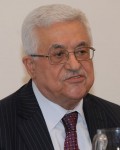 Read in Arabic / Read in German.
Read in Arabic / Read in German.
In the presence and under the patronage of the Federal President of Austria, Dr. Heinz Fischer, the Former Federal Chancellor Dr. Franz Vranitzky and former Federal Minister Dr. Rudolf Scholten welcomed the President of the Executive Committee of the PLO and President of the Palestinian National Authority Dr. Mahmoud Abbas on Monday, November 26 2011, to give a lecture about “The Peace Process: Deadlock and Solutions” before dozens of ambassadors, diplomats and intellectuals, Austrians, Arabs and Jews, at the Kreisky Forum in the 19 district in Vienna, an occasion which coincided with the 100th anniversary of Bruno Kreisky. (Click on the small images to make them bigger).
Bruno Kreisky was born in 1911 and died in 1990; he was the Chancellor of
Austria in 1970. The Palestinians remember Kreisky as a leader of peace. He succeeded in breaking the blockade around the PLO and to be the first Western leader who met with President Yasser Arafat in 1979. Pictures of Kreisky and Arafat during their historical meeting hang on the wall of the Kreisky Forum. The former Chancellor attended the Palestinian National Council session held on Nov. 15 1988, in which the Palestinians announced the declaration of independence in Algeria, and he authorized the opening of the Palestinian representative mission in Vienna, the first in the world. The former residence of the Kreisky family in Vienna is today home to the “Kreisky Forum for International Dialog”.
President Abbas was amazed at seeing the album with many historical pictures of the meeting held between Kreisky and the late Palestinian President Arafat. President Abbas also signed the visitors book at the Kreisky Forum, which many leaders, politicians and diplomats have signed.
Former Chancellor Dr. Vranitzky welcomed President Abbas with a short speech: “First I want to welcome President Abbas and the Palestinian delegation joining him in this house. A lot of history was made in this house, where many important issues were discussed by chancellor Kreisky and his international friends. Many of them were related to faith of the Palestinian people, and the Palestinian-Israeli conflict, many ideas towards the solution of the conflict were born and analyzed here.
In the early 1970, Chancellor Kreisky shocked our friends and allies by granting recognition to the PLO and by suggesting that only through direct negotiations between the parties directly involved one could come closer to a solution.
In Austria we see only one possible solution; two secure states within secure
boundaries living next to each other. The Palestinians with a considerable Israeli minority, and Israel with a considerable Palestinian minority under international guarantees and with full protection for their human rights. This is what we work for and this is what during decades with patiently worked for.” Dr. Vranitzky then invited President Abbas to give a speech before the invited guests.
You can hear the full speech of Dr. Vranitzky below.
President Abbas thanked the organizers of the event at the Kreisky Forum on behalf of the Palestinian people. Some quotes from his speech:
“On this occasion we remember the friendly state of our friend, Chancellor Dr. Bruno 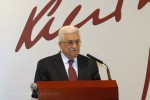 Kreisky, where today we relive the memory of a centenary (100 year) of his birth, and his historical role in leading and building the issues of justice, peace, democracy and independence, especially the issue of the Palestinian people, stressing that the Palestinians will continue mentioning and remembering his true role in the field of the establishment of just and lasting peace in our region through many initiatives for resolving the Arab-Israeli conflict and to enable our people to achieve their freedom and independence.”
Kreisky, where today we relive the memory of a centenary (100 year) of his birth, and his historical role in leading and building the issues of justice, peace, democracy and independence, especially the issue of the Palestinian people, stressing that the Palestinians will continue mentioning and remembering his true role in the field of the establishment of just and lasting peace in our region through many initiatives for resolving the Arab-Israeli conflict and to enable our people to achieve their freedom and independence.”
Abbas appealed to the audience saying: “The United Nations decided on November 29 1947 the partition (division) of Palestine, and here is one state, the State of Israel is recognized, and the second one, the State of Palestine, is still struggling for international recognition after sixty-four years”.
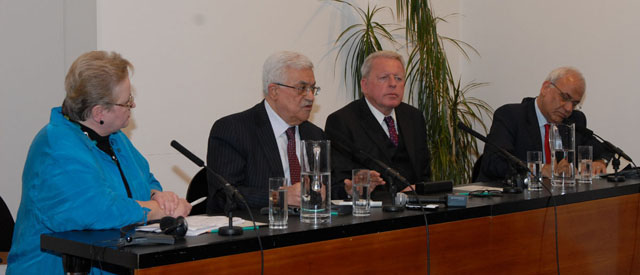
From left: Gudrun Harrer/DerStandard, President Abbas, Former Chancellor Vranitzky, Dr. Saeb Erekat
Abbas said: “Ending Israel’s occupation of Arab territories and Palestine, since June 1967, and the establishment of a Palestinian State in Gaza and the West Bank and its capital is East Jerusalem will lead to the recognition on side of the Arab and Muslim countries of Israel and to a normalization of the relations with them as stipulated in the Arab peace initiative, supported in full by the international community and approved by UN Resolution 1515.”
Abbas said that the settlements (colonies) are the main obstacle to peace, and that the Israeli government continues to expand the settlements in the West Bank “The most grave issues in the ongoing judaization of East of Jerusalem and the apartheid wall, which changes the facts on the ground, and surrounds our towns and villages at a time when we are in greatest need to build bridges of peace and coexistence”.
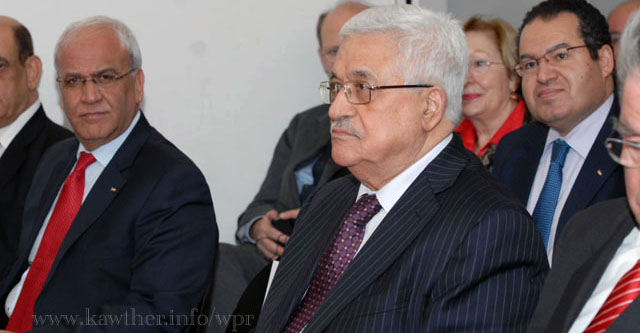
From left: Dr. Saeb Erekat, President Abbas
He added: “We are still together with the international quartet and the various countries involved in the process of peace, waiting for a clear and written stance (position) from the Israeli government on the themes of borders and security”.
“We will continue to adhere to the option of peace and negotiations, and we bet on the ability of the international community to launch a process of meaningful negotiations, based on the terms of reference of the peace process and the foundations that we have mentioned, without double standards on the application of the resolutions and international legitimacy.
Abbas clarified the application for membership at the United Nations, saying that it is not an unilateral act and it is not meant to isolate or to delegitimize Israel or to clash with international community, but that it is our legitimate right, which will put an end to the historical injustice inflicted on our people.
On the level of the internal Palestinian affairs, Abbas said: “We have made great efforts at 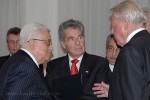 the level of security and strengthening the power and the rule of law, transparency, building public institutions, development of national economy and a culture of peace, and the peaceful transfer of power through the elections”. He confirmed that the State of Palestine will be a state of democracy, of respect for human rights, women rights and of private and public freedoms. “We have come a long way in achieving an important reconciliation and ending the Palestinian division” he said.
the level of security and strengthening the power and the rule of law, transparency, building public institutions, development of national economy and a culture of peace, and the peaceful transfer of power through the elections”. He confirmed that the State of Palestine will be a state of democracy, of respect for human rights, women rights and of private and public freedoms. “We have come a long way in achieving an important reconciliation and ending the Palestinian division” he said.
At the end of Abbas speech, he said: “We are looking forward with great hope to continue your support for Palestine and our fair demand to a full membership of the United Nations because this will be an approach towards building a just and lasting regional peace, and it will end at once the violence in the region”. He added: “It is not possible that the situation will continue like that under the “Arab spring” prospers in the region, which we hope will bear the fruits of establishing lasting democracy and human rights in the Arab world”. He said that the key to security, stability and prosperity in the Middle East depends on two factors: “peace and democracy”.
You can hear the full speech of President Abbas in Arabic below.
Possibly related posts (automatically generated):
- Jim Boumelha NUJ’s Jim Boumelha re-elected IFJ President The world congress of the International Federation of Journalists (IFJ) meeting in Cadiz,...
- Thanks to Dublin November 7, 2010 Dear Lord Mayor Gerry Breen, Dear Minister Mr. Micheál Martin, Dear Minister Connor Lenihan, Dear Ambassador Frank...
- A Prosaic Speech Of Solidarity With Israel In a speech which was read at the UN on the occasion of International Day of Solidarity with the...
- Confrontation With PA Commissioner At UN Image from the the confusion. During a Palestinian-Palestinian confrontation, between me and Dr. Nabil Shaath, the member of the Central...
- Austro-Arab MED and Pharmacist Union د.تمام كيلاني رئيس اتحاد الاطباء والصيادلة العرب النمساويين تهنئة واعتذار لإتحاد الأطباء والصيادلة العرب النمساويين بمناسبة الذكرى السنوية الخامسة...






No comments:
Post a Comment